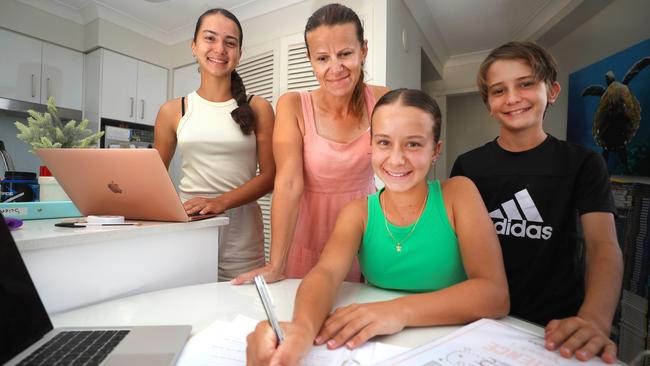Covid-enforced remote learning opens families eyes to permanent homeschooling benefits
There was an almost 70 per cent spike in Queensland homeschool enrolments from 2021 to 2022, according to the Department of Education.
Education
Don't miss out on the headlines from Education. Followed categories will be added to My News.
COVID-enforced remote learning has led to more students ditching mainstream schools with homeschool providers reporting spikes in 2023 enrollments.
Online education provider Euka saw national student numbers increase from 4900 in 2021 to 13,356 in 2022 - of which about 4700 students are in Queensland.
While their program covers from Kindergarten, they have reported the strongest interest for 2023 enrolments for Year 11 and 12.
Fellow private provider Cluey Learning, who offer homeschooling and extra tutoring, has also experienced a post-pandemic spike in students in Queensland, NSW and Victoria.
The company had just one new student from Queensland in 2019 and none in 2020, but it picked up two new Queensland students in 2021, 28 in 2022, and 23 this year so far.
Cluey Learning chief learning officer Dr Selina Samuels said there had been a noticeable increase in children turning to them for support due to physical and mental health issues.
“During Covid, we saw a huge number of new kids,” she said.
“Students were at home and parents felt not equal to the task of teaching and were looking for extra expert support.
“But Covid also showed us that online education is a viable supplement and alternative to school.”
Gold Coast mum Vesna Kacar enrolled her children with Euka last year to help support her children pursuing professional sport.
Sixteen-year-old Mia and 14-year-old Emma play tennis, and 12-year-old Luka plays soccer.

“They just needed more time for training,” Ms Kacar said.
“Homeschooling cut out the travel to and from school, and the parts of school they didn’t like.
“During the first Covid lockdown, they really enjoyed studying from home.”
The trio hope to pursue their sporting passions later this year in Croatia or Serbia.
“Homeschooling has been good in terms of time and flexibility, they’re not sitting there 9am-3pm,” Ms Kacar said.
“Usually my children will do lessons in the morning, then they go to training, then they do more schoolwork, and they rest in the afternoon before more training. It’s usually three to four hours of schoolwork per day.”
Home Education Association Queensland leader Samantha Bryan said “school refugees” are becoming more common – when parents pull their children out of school midway through their education.
“Historically, home schooling was generally people who had philosophical reasons and kept their children out of school right from the get go,” she said.
“But during the pandemic, parents got a taste of home education and more often than not it was a positive experience of life not being so rushed and their child coping better.”
Euka founder Ellen Brown said homeschooling is no longer just for disengaged children.
“It just allows them to invest their precious time and energy into endeavours they believe will serve them best in adult life,” she said.
While the Department of Education won’t release official 2023 homeshcool registration data until later this year, they recorded an almost 70 per cent spike in Queensland homeschool enrolments from 2021 to 2022.




